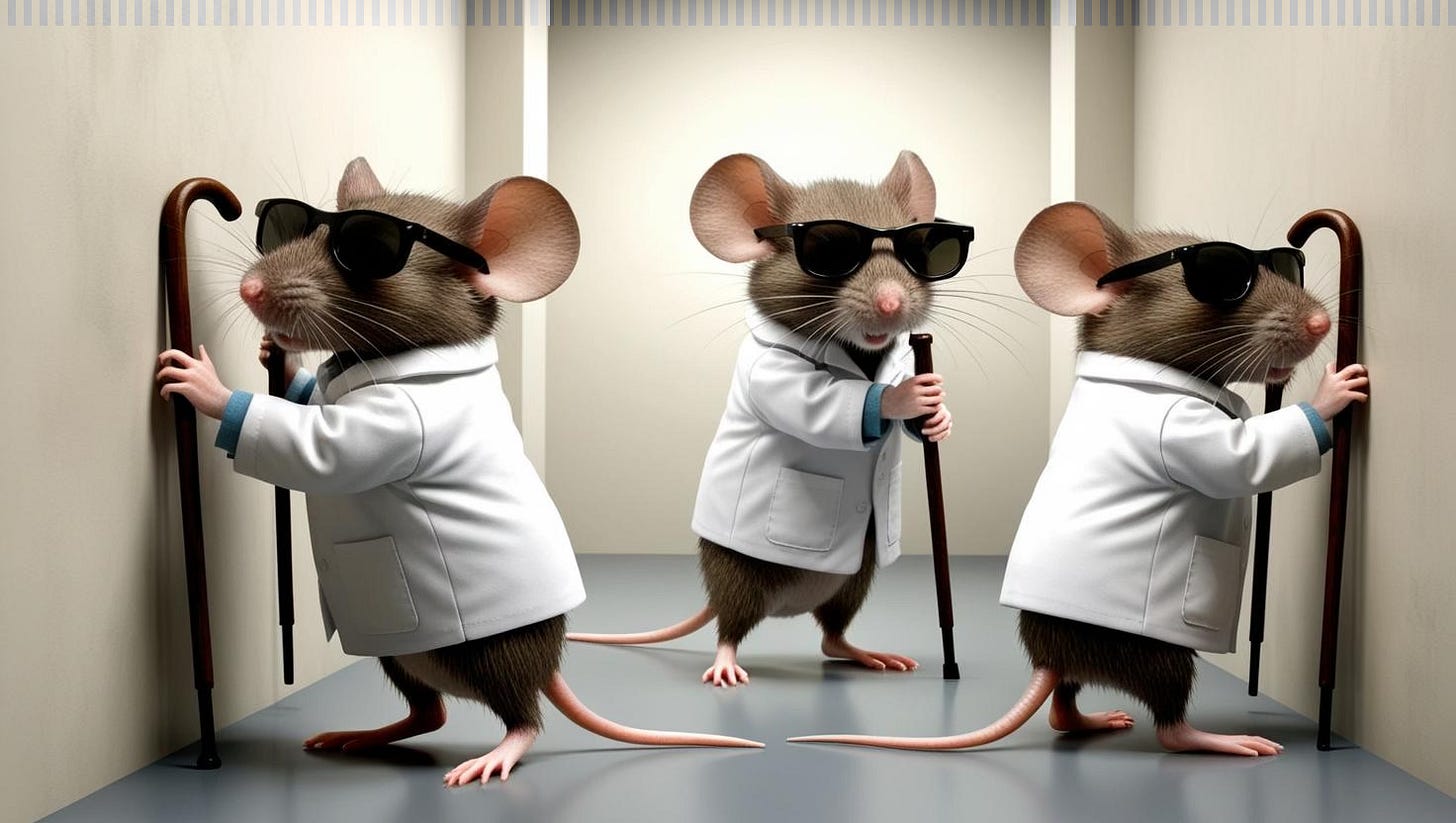My son slept in the chair next to me as I presented his long list of symptoms to his third neurologist. “It began with sudden onset of physical and verbal tics when he was seven,” I started, adding ever more unusual symptoms, some that stayed and some that flared like a falling star, appearing and disappearing seemingly randomly.
“That’s quite a list,” the neurologist replied. “These are of interest to me,” he continued choosing two-thirds of them. Later in the appointment, I asked him about the ones he left out. “Oh, those aren’t my area of expertise. They’re not relevant.”
But he was wrong. They were relevant and my son nearly died. All his symptoms were connected to one medical condition with one cause that he missed — as did a dozen others — because he was hyperfocused on pieces of my son rather than all of him.
There’s little you can do to broaden their thinking beyond asking, “What else this can be?”
But you already have access to someone who can.
For most patients, the depth and breadth of a specialist’s expertise and knowledge is effective, if not outright life-saving. We want the best expert’s laser focus on our scary health issue. I’d only want a cardiologist with intimate knowledge of the latest advances in interventional science for heart disease to help me if my heart was failing. I don’t need her to work on my knee pain, too.
Yet, for all their additional years of training and skill, specialists can have blind spots or tunnel vision, missing what’s relevant but outside their limited focus. That means important clues to what is causing those symptoms can fall through the cracks between one expert’s knowledge and the other’s. A frequent complaint I hear from patients is seeing multiple specialists who disagree on their diagnosis or offer no answers at all. No one wants to traipse from specialist to specialist each fixated on a piece of you so they miss the truth. It’s time consuming, expensive, confusing and potentially dangerous.
There’s little you can do to broaden their thinking beyond asking, “What else this can be?” But you already have access to someone who can.
The Referral Tango: Primary Care Takes The First Step
The best way to get a specialist to view you as a whole human being — and not just a malfunctioning organ or system — is to have your primary care physician (PCP) present your full case when they refer you. Before you’re referred, she should have already narrowed down the possible list of diagnoses based on your description of your symptoms; what it feels like, how long it lasts, when it happens, and the rest of The Eight Characteristics of a Symptom Tool. That list is called a diagnostic differential.
I wish that was how my son’s pediatrician worked. She just sent us to a long list of -ists and shrugged her shoulders when they disagreed with one another. She ultimately referred us to over a dozen specialists and never discussed or challenged their conclusions.
The Centers for Medicare & Medicaid Services (CMS) — a federal agency — views the role of the PCP as both gatekeeper and care coordinator for the patient. They train PCPs to write a detailed referral that guides the specialist to see the whole patient and not just a body part or organ.
CMS notes that the referral process “is a bit like the tango” because both doctors need to partner for the best outcomes. They add that it’s the PCP’s responsibility to optimize the referrals calling it “a core activity of care coordination.”
For most patients, the depth and breadth of a specialist’s expertise and
knowledge is effective, if not outright life-saving.
CMS’ referral training includes specific guidelines and an impressive referral checklist for PCPs to use when referring a patient to a specialist from the American College of Physicians (ACP). Take a look at the checklist and — if you feel comfortable doing so — bring it as a discussion tool. In Chapter 3, I reviewed shared decision making as the best way to work closely with your PCP. This is another great opportunity for using that technique. Ask your doctor if they use this referral checklist. Request to review what the PCP will include in the referral as part of the ideal shared decision making process. For example, you may ask:
Which test results will be included?
What secondary concerns will you include?
What level of urgency are you assigning to the referral?
Can your staff help me make this appointment? (Especially important for urgent issues.)
May I have a copy of the referral note for my records?
Don’t be surprised if your doctor doesn’t give you a copy in advance. They won’t have written it yet and they may forget to post one in your patient portal.
The PCP’s care coordination role also means that the two of you should meet after your specialist appointment to review what they recommended, hear your thoughts and add their point-of-view. Do they agree? What impact would this treatment path have on your other medical issues? On your life style? On your wallet?
In The Specialist’s Office
The goal is to get the benefit of the specialist’s expertise without them missing essential clues. So, prepare for the visit the same way you prepared for the primary care visit with one exception. After the introductions, ask if she has had a chance to review the full referral note from the PCP. The specialist probably won’t review it until just prior to your appointment or, in my experience, they review it while you’re sitting there feeling awkward. It’s okay.
Once the specialist asks her version of “Why are you here today?” use the tools I’ve shared with you, especially your under 3 minute presentation and the Eight Characteristics of a Symptom Tool.
This may be a generalization but, in my experience, specialists use jargon more often than primary care doctors do and many speak too quickly. Two ways to protect yourself:
Bring a friend or family member and ask them to be the notetaker. Tell them to note every medical term and check off questions as you ask them.
Ask if you can audio record the specialist’s next steps and analysis. Tell her why without emotion or rancor. “You’re speaking so quickly (or you’re using terms I don’t understand) so may I record your analysis so I can listen to it again later?” If she says no, ask her to slow down. Give your notetaker permission to ask for terms to be explained.
Don’t be afraid of asking all the questions you have. A big part of their job is to make certain you understand your options and next steps. If you have any special medical needs, like you require a wheelchair or are unable to drive or are on a high risk medication, discuss them openly. Same is true of cultural or religious concerns.
Remember, many of the issues that plague us might be due to problems in more than one organ or system. Chest pain, for example might be caused by cardiac (heart), orthopedic (muscle strain), pulmonary (lungs), gastrointestinal (digestive system) or other issues. Even if the specialist can reduce your chest pain, if they’re treating the wrong cause, more symptoms will appear, and you won’t get better.
So, towards the end, ask about any other symptoms that haven’t been discussed. “Before I leave, is it possible X, Y or Z are related?” If he dismisses those as irrelevant, ask, “Do you think these other symptoms are concerning? What else could be causing them?” Not asking means both of you may forget to address the whole person that is you.
I’ve been to specialists that have said, “I don’t know why Dr. ABC sent you to me. This is not fill in the blank.” Honestly, I’ve burst into tears a few times when that’s happened. It’s such an awful feeling to have your hopes for an answer dashed. Not a strategy I’d recommend. Eventually, I gathered myself and asked, “What else might this be?” And then requested they share those thoughts in their letter to the PCP.
PRO TIPS
When your PCP refers you, don’t forget to check out the specialist using the steps in Chapter 6.
If your doctor doesn’t use an extensive referral checklist, you can create your own. Use the ACP referral checklist as a guideline. There’s a good reason the ACP recommends this specific level of detail. Be proactive here to protect yourself and to get the most from the specialist’s time and yours.
Ask the specialist for handouts or websites that will help you learn more. One of my son’s doctors always sent me home with two or three clinical studies.
After seeing a specialist, ask both the specialist and the primary doctor for a copy of their correspondence about your case. When I took my son from his pediatrician’s care –– and requested all of his medical records –– I saw the specialists’ letters for the first time. I was shocked how many significant factual errors those letters contained. By then, it was too late to fix the issues. You can do better than I did. Ask after every specialist appointment when you meet with your PCP to review.
There are AI tools that can help. We’ll discuss them in a later chapter.
If your PCP refuses to write a detailed referral, get a second opinion or find a new PCP. We’ll discuss how to do both in later chapters.
What have you tried with a specialist to be seen as a whole person? Please share which techniques have worked for you.
Next up: Medical Testing Secrets. What You Need To Know And Do When Your Doctor Orders Tests
© Helene M. Epstein 2025









"If the only tool you have is a hammer, then everything looks like a nail." True in many fields, doubly true when it comes to medical specialists.
Any tips on dealing with a situation where a primary care doctor suggests only a specialist within her/his hospital system? I think some patients feel almost guilty if they don't take the suggestion of their PCP, and that's often within their healthcare system.